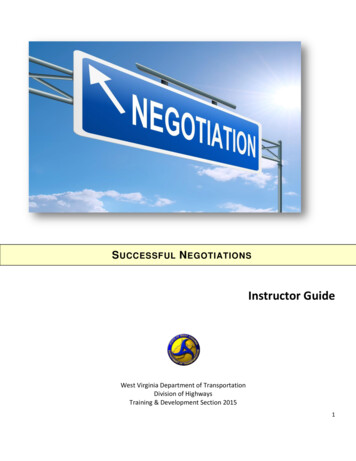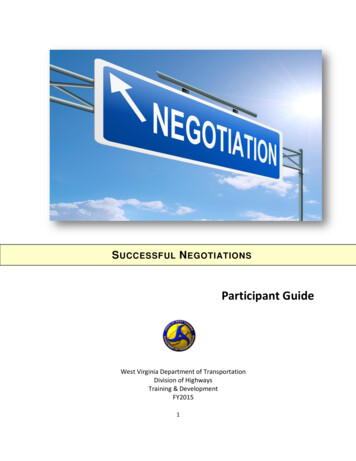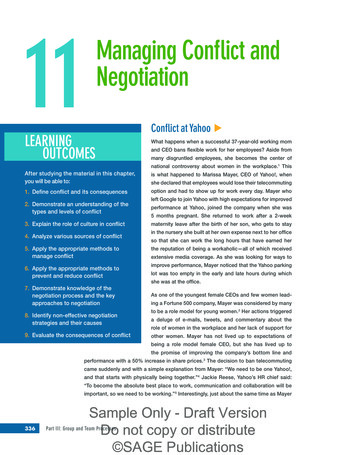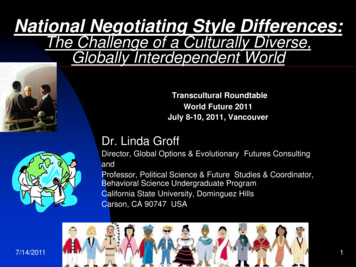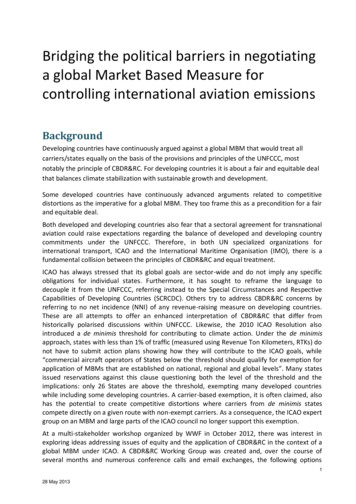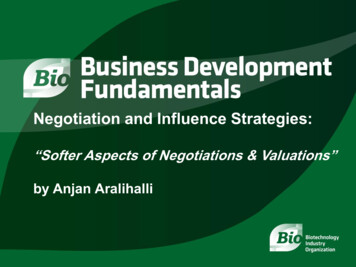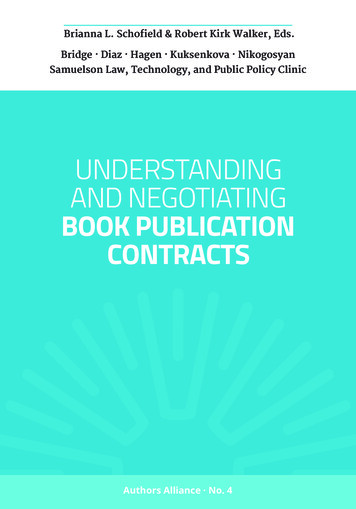
Transcription
Brianna L. Schofield & Robert Kirk Walker, Eds.Bridge · Diaz · Hagen · Kuksenkova · NikogosyanSamuelson Law, Technology, and Public Policy ClinicUNDERSTANDINGAND NEGOTIATINGBOOK PUBLICATIONCONTRACTSAuthors Alliance · No. 4
2018 Authors Alliance, CC BY 4.0You are free to:Share: copy and redistribute the material in any medium or format.Adapt: remix, transform, and build upon the materialfor any purpose, even commercially.The licensor cannot revoke these freedomsas long as you follow the license terms.Under the following terms:Attribution: You must give appropriate credit, provide a link to the license, andindicate if changes were made. You may do so in any reasonable manner, but not inany way that suggests the licensor endorses you or your use.No additional restrictions: You may not apply legal terms or technological measuresthat legally restrict others from doing anything the license 0No Legal Advice: While this guide provides information and strategies for authors whowish to understand and negotiate book publication contracts, it does not apply this information to any individual author’s specific situation. This guide is not legal advice nor doesusing this guide create an attorney-client relationship. Please consult an attorney if youwould like legal advice about your rights, obligations, or individual situation.Typeset by Jasmine Rae Friedrich in Titillium, Open Sans and Merriweather.
UNDERSTANDINGAND NEGOTIATINGBOOK PUBLICATIONCONTRACTSPREPARED FOR AUTHORS ALLIANCE BY:Brianna L. SchofieldRobert Kirk WalkerKatherine BridgeAlfredo DiazKaren Graefin vom HagenAnna KuksenkovaHenry Nikogosyan
ACKNOWLEDGEMENTS:Authors Alliance thanks Katherine Bridge, AlfredoDiaz, Karen Graefin vom Hagen, Anna Kuksenkova,Henry Nikogosyan, Robert Walker, and Berkeley Law’sSamuelson Law, Technology & Public Policy Clinic forresearching and authoring this guide. We are grateful tothe authors, literary agents and attorneys, and publishers who provided the stories, survey responses, andexample contracts that inform this guide.We are humbled by the generosity of our Kickstarter backers, listed at the end of this guide. We alsogratefully acknowledge the support of the followingco-sponsors:
We are indebted to Peter Berkery, Katharine Dunn,Ellen Finnie, Mary Francis, Kathryn Hashimoto, DonaldLamm, Jacqueline Lipton, Gita Manaktala, PamelaSamuelson, Molly Shaffer Van Houweling, SidonieSmith, Erik Stallman, Douglas Van Houweling, CharlesWatkinson, and Katie Zimmerman for their review andhelpful comments on drafts of this guide. Mistakes areours alone.Finally, thank you to all Authors Alliance members:Your support makes all our projects possible.A NOTE TO OUR READERS:Please visit Authors Alliance on the web athttp://authorsalliance.org for resources related topublication contracts, fair use, rights reversion, termination of transfer, and more. Please consider supporting our work by joining us as a member or making adonation.
TABLE OF CONTENTSI.Introduction2Chapter 1: About This Guide8Who Should Use This Guide?10How Was This Guide Created?11What This Guide is Not12How to Use This Guide13Chapter 2: Contract Basics16Aren’t All Publication Contracts the Same?Chapter 3: Negotiation Fundamentals1924Negotiation is a Conversation,Not a Confrontation26Should I Have an Agent or anAttorney Negotiate for Me?27What Are Your Goals for Your Book?29How Do I Prepare for a Negotiation?31What Should I Expect the NegotiationProcess to Be Like?35When Should I Consider Walking Away?37A Few Negotiating Techniques37One More Step: Save Your Agreement41
II.The Grant of Rights44Chapter 4: What Rights?48Copyright49Joint Works52Chapter 5: The Grant of Rights Clause56Assignments58Exclusive Licenses59Non-Exclusive Licenses60Options for Limiting the Grant of Rights63Limit the Scope of the Rights Granted65Limit the Duration of the Grant67Ask for a License-Back70Insert a Revert-Back Clause71Reserve Rights Not Granted73Chapter 6: Subsidiary Rights76Common Subsidiary Rights79Electronic Rights80Paperback Rights82Audiobook Rights83
III.Foreign Rights84Translation Rights85Dramatization Rights86Commercial Exploitation Rights87Serial Rights87Book Club Rights88Getting Your Fair Share89Other Ways to Have a Say91Approvals and Consultations91Notice Provisions94Contract Checklist96Your Obligations98Chapter 7: Your BookManuscriptDelivery of Manuscript100101102Conditions That the Manuscript Must Satisfy 104Copyediting and Proofreading110Indexing113Conditions for Termination114
Third-Party Permissions115Warranties and Indemnities119Warranties120Originality and Third-Party Rights121Defamation122Accuracy123Is There a Way to Relax the Warranties?123IndemnificationChapter 8: Future Works125130Option Provisions131Revised Editions134When Will You Have toComplete a New Edition?135How Much of the Original TextWill You Have to Change?136How Will Royalties Be Calculatedfor a New Edition?136How Will the Revised Edition Be Credited?137Non-Compete ProvisionsContract Checklist137142
IV.V.Getting Your Book To Market144Chapter 9: The Finishing Touches146When Will Your Book Be Published?148The Price of Your Book150The Look and Feel of Your Book153Format154Book Cover and Title154Book Design and Production157Chapter 10: Copyright Registration160Chapter 11: Advertising and Promotion166Use of Your Name and Likeness170Review Copies174Author’s Copies175Contract Checklist178Follow The Money180Chapter 12: Advances182How Much Should Your Advance Be?186What Happens if Your BookDoesn’t Earn Out?189
Other Situations in Which YouMay Have to Repay an AdvanceChapter 13: Royalties191196Published Price Royalties198Net Income Royalties199Net Profit Royalties202Putting It All Together203Other Factors That May InfluenceYour Royalties206Escalations206Small Reprintings207Reserves on Returns207Deep Discounts209Remaindered Books211Chapter 14: Accounting214Account Statements215Payments218Recordkeeping and Audits220Limitations on Auditing222Contract Checklist224
VI.Parting Ways226Chapter 15: Rights Reversion230Triggering ConditionsVII.233Out of Print234Earning and Sales Thresholds236Stock Threshold238Hybrid Triggers239Initiating a Reversion240Additional Obligations242Chapter 16: Assignment Provisions244Chapter 17: Termination250Termination Conditions251Notice Provisions254Liquidated Damages256After Termination257Contract Checklist260Conclusion262Kickstarter Backers266Endnotes270
SECTION I:INTRODUCTION
WE A L L R E G UL A R L Y S IG N, C L IC K , S A Y “ OK,”or otherwise agree to a variety of contracts in our dailylives. For most of us, having the time to review themin detail is out of the question. But if you are an author,a book publication contract (also called a publishingagreement) is one that deserves careful attention. Itsterms can affect your control of your book and dictateyour rights and obligations for many years to come.A bad contract can even limit your ability to get yourwork into the hands of readers. Helping authors avoidnegative outcomes and increase the impact of theircontributions to knowledge and culture is a key part ofthe Authors Alliance mission, and our motivation forbringing you this guide.Authors are sometimes so grateful to receive apublication offer that they may be tempted to sign the
first version of a publication contract that they receive,especially if negotiating seems complicated, intimidating, or risky. But there is a lot at stake for authors ina book deal, and it is well worth the effort to read thecontract, understand its contents, and negotiate forfavorable terms.Happily, copyright laws give authors somethingvery valuable to bring to the negotiating table.1Copyright confers on the author of a work certainexclusive rights—such as the right to reproduce thework and to distribute copies of it to the public—forthe life of copyright. Under copyright law in the UnitedStates today, copyright protection for original, creativeworks is automatic from the moment the work is “fixedin a tangible medium” (e.g., as soon as the author putspen to paper, paintbrush to canvas, or saves a computerfile). Currently, copyright protection for works by anindividual author lasts for the life of the author plusseventy years.A publication contract outlines what rights you asan author are granting to your publisher and on whatterms. If you sign away all of the rights in your book tothe publisher for the life of copyright, this will precludeyou from certain future uses of your work. For example,4Understanding and Negotiating Book Publication Contracts
you won’t be able to make derivative works like translations, audio editions, or revised editions, because yourpublisher now has all the exclusive rights as the work’snew copyright owner. Even if you don’t have any futureplans for your work, you may still regret transferring allrights if your publisher does not make full use of them,your book falls out of print, or sales drop. In thesecircumstances, your publication contract will constrainyou from making your book more widely available. At aminimum, you should carefully consider whether yourpublisher needs all the rights its standard contract asksfor.The grant of rights clause is only one part of thecontract that deserves your careful attention. Theterms of the contract can also dictate, for example, yourcommitments relating to the manuscript and futureworks, who is responsible for legal claims stemmingfrom your book’s content, how much input you havein the appearance of your book, how your book will bepromoted, the specifics of how you will be paid for yourbook, whether and how you can regain control over therights to your book, and much more.This section provides an overview of the guidein Chapter 1: About This Guide, an introduction toIntroduction5
contracts in Chapter 2: Contract Basics, and a primeron negotiations in Chapter 3: Negotiation Funda-mentals.6Understanding and Negotiating Book Publication Contracts
CHAPTER 1:ABOUT THIS GUIDE
THI S G UI D E I S DE S IG N E D TO M A K E I T E A S IE Rfor authors to understand and negotiate their bookpublication contracts. Specifically, this guide will helpauthors: Understand common clauses that appear in bookpublication contracts; Recognize how a contract’s terms might affecttheir goals for their books; Formulate author-friendly variations of contractterms; Negotiate for terms that advance their interests;and Avoid terms that hinder their goals.This guide is part of a collection of resources for authorsreleased by Authors Alliance, a nonprofit organization
that promotes authorship for the public good by sup2porting authors who write to be read. Authors Alliancecreated this guide as a part of our mission to helpauthors understand and manage the rights necessaryto make their works broadly available now and in thefuture.WHO SHOULD USE THIS GUIDE?This guide was written for all authors who want moreinformation about book publication contracts. It isrelevant not only to authors who are signing theirfirst book deals and know little about the publishingindustry, but also to veteran authors who want to betterunderstand the contracts they previously signed or whowant tips about how to negotiate for better terms fortheir latest books.The contract terms this guide covers are relevantto authors of both fiction and nonfiction and are applicable to agreements with academic presses as well aswith trade (commercial) publishers. This guide identifies some common differences between terms found incontracts with academic versus trade publishers thatreflect their different business needs. A publisher’swillingness to accept any particular clause will vary,10Understanding and Negotiating Book Publication Contracts
and is often largely dependent on business concerns.Although many clauses in book publication contractsalso appear in contracts for short-form works (suchas scholarly or magazine articles), this guide does notspecifically address these formats.While this guide may be particularly useful toauthors who do not have agents to help them interpretand negotiate their contracts, authors with agents mayfind that this guide will help them better communicatewith their agents and ultimately end up with betterresults in negotiations. Authors with agents shouldbe aware, however, that they may be restricted by theterms of their agency agreements from approachingtheir publishers directly on matters related to theircontracts, or they may prefer to have their agents speakwith publishers on their behalf.HOW WAS THIS GUIDE CREATED?This guide is the product of extensive interviewswith dozens of authors, publishers, literary agents,and copyright experts who shared their knowledgeabout publication contracts and the book business.In addition, we received more than fifty surveyresponses from authors who shared stories of negoti-About This Guide11
ation successes and contract regrets. Throughout thisguide, these real-life stories are set out in text boxeslabeled “Success Story” and “A Cautionary Tale.” Fictitious examples to reinforce key concepts are labelled“Literary Lesson.”In addition, we analyzed nearly one hundred realpublication contracts that authors shared with us forthis project. Edited clauses from these contracts appearthroughout this guide, including those you might wantto avoid and author-friendly alternatives.WHAT THIS GUIDE IS NOTThis guide provides general information about commonterms in book publication contracts and presentsstrategies for authors who wish to negotiate for moreauthor-friendly variations. It does not apply this information to any individual author’s specific situation.This guide is not legal advice, nor does using this guidecreate an attorney-client relationship. Please consultan attorney experienced in handling publicationcontracts if you are unsure how the information in thisguide applies to your particular facts or if you would likelegal advice about your rights and obligations.12Understanding and Negotiating Book Publication Contracts
Publication contracts vary by country, as docontract and copyright law. This guide has beenprepared and vetted with U.S. laws, standards, andpractices in mind. As such, the information in thisguide is most applicable to publication contracts originating in the United States.While this guide explains many common clausesfound in publication contracts, it does not cover allpossible terms you may encounter or all potentialoptions for negotiating these terms. Likewise, becauseauthors have different priorities when it comes to whatis important to them in a book deal, this guide does notprovide a one-size-fits-all model contract. Instead, theinformation in this guide is intended to help authorsunderstand a range of possible options for negotiation,which they can implement based on their personalgoals.HOW TO USE THIS GUIDEIf you want a broad overview of book publicationcontracts, you can read this guide from front to back.But if you just want to understand (and negotiate) afew specific clauses, feel free to navigate straight to therelevant section. (If you are reading this guide in print,About This Guide13
the thumb index on the back cover will quickly directyou.)If you don’t know where to start, consider this:All authors share a desire to make and keep their booksavailable to readers. For this reason, we encourageauthors to devote extra attention to clauses in theircontracts that affect the long-term availability of theirbooks. For example, the rights that you grant yourpublisher can affect your ability to use, share, or adaptyour book in the future (see Chapter 5: The Grant ofRights Clause and Chapter 6: Subsidiary Rights).And your contract may even define what you can dowith future works (see Chapter 8: Future Works).Finally, your contract can identify the conditionsunder which you may be able to regain your rights toyour book, such as if your work falls out of print (seeChapter 15: Rights Reversion).Authors and their representatives are encouraged to use this guide as a catalyst for creativethinking about what terms need to be included in acontract to meet their publishing goals and how theymight improve upon terms that their publishers have14Understanding and Negotiating Book Publication Contracts
proposed. If you come up with a solution that works foryou and might be useful to other authors, let us know—it might appear as a Success Story in a future edition ofthis guide.About This Guide15
CHAPTER 2:CONTRACT BASICS
AT IT S C OR E , A C O NTR A C T I S S I M P L Y A Nagreement between parties to determine the legalrights and obligations they have to each other. Oftenthis is in exchange for money, but it could also be in exchange for a promise to do (or not do) something in thefuture. Contracts can be as simple as a casual promisebetween friends (“If you drive me to the movies, I’ll buyyour ticket”) or as complex as a multi-national treaty.Contracts can be created in a variety of ways:orally (“Yes, let’s go to the movies”); in writing(“Here’s a cocktail napkin with an IOU for one movieticket”); or through your conduct (driving your friendto the theatre). Contracts can even be implied in certaincircumstances. Contracts can also be formed through aseries of interactions. For example, a contract could be
formed through a thread of emails. But for the purposesof this guide, the terms “contract” or “agreement”refer to a formal written publication contract. The partsof a written contract are its “terms,” “clauses,” or“provisions,” which all mean the same thing.Certain kinds of contracts, such as those thattransfer exclusive copyright rights, must be inwriting and signed by the book’s author (or herrepresentative) to be valid and enforceable. (SeeChapter 5: The Grant of Rights Clause for moreinformation on assignments and exclusive licenses).For example, if Alyssa Author wants to give PollyPublisher the exclusive right to reproduce and distribute her work, she needs to do so explicitly in asigned, written document.Likewise, contracts that cannot be performedwithin one year must be in writing and signed. Forexample, if Polly Publisher agrees to publish AlyssaAuthor’s book eighteen months after delivery of anaccepted manuscript, their agreement has to be inwriting and signed to be binding.18Understanding and Negotiating Book Publication Contracts
A best practice in negotiating book contracts is to makesure everything the parties agree to is written down,and that everyone signs the document reflecting thisagreement. This provides a record of the agreed-uponterms and helps ensure that everyone understands thesubstance of the agreement.AREN’T ALL PUBLICATIONCONTRACTS THE SAME?There is no such thing as a “standard” contract thatis applicable to all types of publishers and all books.A publisher’s willingness and ability to accommodateyour preferred terms will be influenced by its businessmodel. And while there are certainly core terms you’relikely to find in most publication contracts, how theseprovisions are organized and the language used todescribe them will differ, sometimes significantly.If you haven’t done so already, it is a good idea toset aside time to research potential publishers for yourproject before you (or your agent) start shopping yourbook so you can determine if your publishing needs arealigned with a particular publisher’s business goals.For example, it is uncommon for university pressesto offer sizeable advances to authors—most don’tContract Basics19
offer advances at all—whereas advances are generallyexpected in trade publishing. Similarly, universitypresses may be more amenable to allowing books tobe distributed under open access terms (like a CreativeCommons license) than a trade publisher, since theyare usually less concerned with maximizing profits andopen access may align with their academic mission.On the other hand, trade publishers may offer advantages for certain authors. For example, they often havelarger distribution networks (though online booksellinghas diminished this advantage somewhat), and theymay offer better marketing and advertising support.Not all publishers within a category operate in exactlythe same way, however, or for the same reasons. Andmany publishers have imprints that publish differentgenres of books and follow different business models(and some university presses have substantial tradeprograms). The bottom line: It pays to do your researchso that you can select a publisher with a business modelthat aligns with your interests. This increases the likelihood that you’ll successfully negotiate a publicationcontract that meets your needs.Notwithstanding the importance of selecting apublisher that has a business model that is compat-20Understanding and Negotiating Book Publication Contracts
ible with your goals, know that each publisher hasits own preferred terms, some of which can be quiteidiosyncratic. Many contracts contain terms thathave been added piecemeal over time in response tospecific negotiations. For example, once upon a time,a publisher decided it would be a good idea to protectitself in case it was sued for copyright infringementcaused by one of its authors. Poof! An intellectualproperty indemnity clause was added to the publisher’s contract. Another time, an author wasn’t happywith the cover art her publisher picked for her last bookand wanted to have a say over what art was used in thefuture. Tada! Approval rights were born. Because termsevolve over time, contracts often seem like the legalequivalent of Dr. Frankenstein’s monster, with partsdrawn from different sources and grafted together in anunruly whole. Or, in slightly less ghoulish terms, manycontracts are like the Chartres Cathedral—the spireswere built at different times in completely differentstyles, but the building still stands up.This is important because you may encounterterms in your publisher’s standard contract that arerelics of past deals and that are inappropriate for yourparticular project. Not all provisions in a publicationContract Basics21
contract work equally well for every author—one sizedoes not fit all—and ideally a contract should reflect anindividual author’s goals and priorities.22Understanding and Negotiating Book Publication Contracts
CHAPTER 3:NEGOTIATIONFUNDAMENTALS
THER E I S A L O T A T S TA K E I N A P UB L I CA T IONcontract, so after you read the agreement and understand its contents, you should consider negotiating forterms that are most consistent with your goals. Authorsmay be tempted to sign a contract right away due tothe excitement of receiving a publication offer. This isa mistake. The book deal is the start of a relationshipbetween you and your publisher that will last for years,and the negotiation is your opportunity to establish theterms of that relationship so that it works for you aswell as for your publisher.
NEGOTIATION IS A CONVERSATION,NOT A CONFRONTATIONFor many people, the prospect of negotiating is intimidating, conjuring images of tense situations or evenhostile confrontations. This kind of “hard” negotiatingscenario is common in movies and TV, but it bears littleresemblance to the way most negotiations actually playout. Rather than viewing it as a competition betweenrivals, think of negotiating as a conversation in pursuitof a shared goal: a successful book. Thought of in thisway, negotiation is a tool to help you build trust andunderstanding with your publisher, which can result ina mutually beneficial outcome. It is also important toremember that just as you bring something of value tothe table (your book and your copyrights), the publisherdoes too (expertise in editing, designing, creatingebooks, distributing, marketing, and sublicensing yourrights).Nevertheless, for many authors, negotiation isunderstandably a daunting prospect. If I try to negotiate,won’t this offend my publisher and cause it to revoke itsoffer? In all likelihood, no, especially if you negotiatein a respectful and reasonable way. In fact, being apolite, realistic advocate for yourself and your book may26Understanding and Negotiating Book Publication Contracts
engender more respect from your publisher. In mostcases, the worst that can happen is that your publishersays “no” to your requests, which doesn’t leave youany worse off than you were to begin with. You canthen decide whether to try to reach a compromise withan alternative version of your request, work with adifferent publisher, or seek additional assistance withthe negotiation. Or you may choose to accept the termsand sign the contract, knowing that at least you tried tocraft it to fit your goals. But if you are successful, you’llthank yourself in the future for making the effort tonegotiate for terms that work for you and your book.SHOULD I HAVE AN AGENT OR ANATTORNEY NEGOTIATE FOR ME?For many genres (such as fiction and trade nonfiction),literary agents function as gatekeepers to publishinghouses. It is therefore common for authors of thesetypes of books to be represented by agents ratherthan to negotiate directly. Conversely, many academicpresses accept submissions directly from authors,making it less common for academic or technicalauthors to have agents—though it’s not unheard of,and some agents specialize in working with academicNegotiation Fundamentals27
authors. However, even if you don’t need a literaryagent, you may still want one. Literary agents typicallywork on commission—i.e., a percentage of yourroyalties. (Working with an agent may involve its owncontract and terms; these types of agreements are notcovered in this guide.)Literary attorneys are lawyers who specializein legal matters related to the business of publishing, including contractual negotiations. By law, onlyattorneys can give legal advice, so if you have specificquestions about the legal effects of your agreement,you might need to engage with both an agent and anattorney. Typically, literary attorneys negotiate publication contracts for authors, but they do not getinvolved in book editing. Literary attorneys will oftencharge a per-hour fee, though some may work on commission like an agent.Although it may be difficult or costly to hire anagent or an attorney, such a representative can provideexpertise about how best to conduct negotiations andoffer distance between you and your publisher if thenegotiation gets sticky. Regardless of whether or notyou have representation, understanding your own28Understanding and Negotiating Book Publication Contracts
agreements is essential to getting what you want out ofthe publishing relationship.WHAT ARE YOUR GOALSFOR YOUR BOOK?The key to any successful negotiation is preparation.Before you begin to negotiate, consider what you hopeto gain from the relationship with your publisher.While authors, in general, share a common goal ofwanting their book to be widely read, what they hope toget out of a publishing deal may vary significantly. Forexample, it may be important for you to have languagein your contract that allows you to: Retain your copyright; Give permission for others to freely use your bookby making it openly accessible; Use your own work in the future; Protect yourself from frivolous claims that mayarise from the publication of your book; Publish additional works on a similar topic; Make your book available at an affordable price; Provide input on design choices, like the book’scover art and title;Negotiation Fundamentals29
Be paid fairly for your work; or Easily get your rights back if your publisher is nolonger making your book available or your book isno longer selling well.Whether it is retaining certain rights to your book,providing input in design choices, or making your workopenly accessible or available at an affordable price,your publishing goals are personal and not necessarilyreflected in a template contract.Literary LessonAs an example of how authors’ goals may differ,consider two archetypes: Annie Academic and EddieEntertainer.Annie Academic, a research scientist, is writinga scholarly monograph called Better Living ThroughBiochemistry. Annie wants her book to be taughtwidely in college classrooms, so she hopes to sellhard copies at a low price and to make the bookavailable online for free. Annie also wants to makesure her contract doesn’t preclude her from republishing parts of her book in scholarly anthologiesand that it doesn’t prevent her from publishing on a30Understanding and Negotiating Book Publication Contracts
similar topic in the future. Because Annie is paid forthe time she spends writing through her academicsalary, she is less concerned about royalties oradvances.Eddie Entertainer is a stand-up comedian whois writing a satiric novel called A Coalition of Imbeciles.Eddie is hoping that this book will propel him tofame and fortune, so he wants to be able to commercially exploit his book in as many ways as possible.Eddie hopes that his book will someday be made intoa movie or a comic book, for which Eddie would liketo write the script. Like many struggling comics,Eddie doesn’t have stable income, so he needs asizeable advance to be able to finish the book. Eddiealso wants to have final say over the book’s cover artand title.HOW DO I PREPARE FOR ANEGOTIATION?First things first: You need to read the proposedcontract and make sure that you understand what itmeans. This guide will help you decipher commonlegal clauses used in publication contracts, but ifyou still don’t understand the terms you may wantNegotiation Fundamentals31
to ask for clarification from your agent, attorney, orpublisher. Publishers welcome the chance to explaincontract terms—they want you to understand whatyou’re signing—and it gives you the opportunity tostart the conversation. Don’t understand what “secondserial rights” are? Not sure of the difference between“foreign rights” and “translation
Oct 03, 2018 · 10 Understanding and Negotiating Book Publication Contracts that promotes authorship for the public good by sup-porting authors who write to be read.2 Authors Alliance created this guide as a part of our mission to help authors understand and manage the rights necessary to make their

